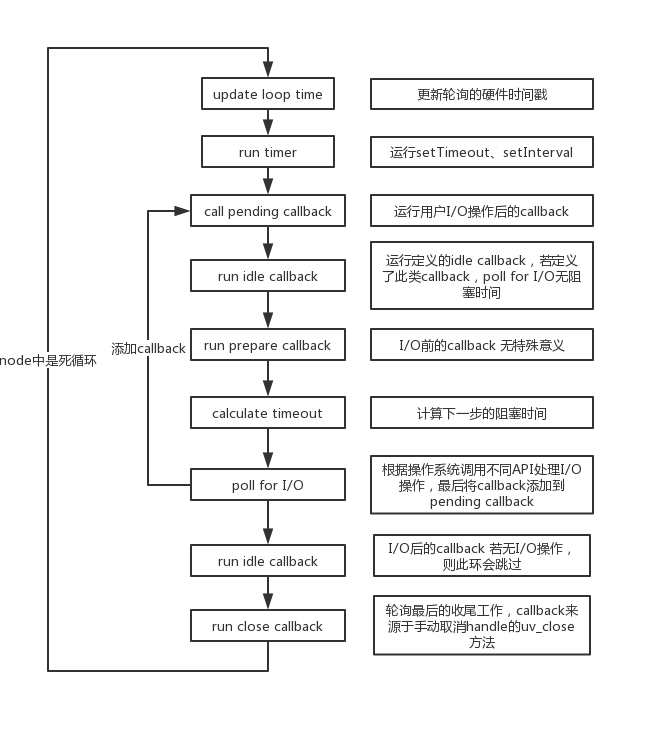浅析libuv源码-node事件轮询解析(2)
上一篇讲了轮询的边角料,这篇进入正题。(竟然真有人看我博客,上两个图给你们整理下思路)
这是轮询总流程图。

下图为本节内容简图。

Poll for I/O
The loop blocks for I/O. At this point the loop will block for I/O for the duration calculated in the previous step. All I/O related handles that were monitoring a given file descriptor for a read or write operation get their callbacks called at this point.
简单来讲,就两点:
1、根据计算的timeout来进行I/O操作,这里的操作包括fs.readFile、fs.stat等,期间进程将被阻塞。
2、所有I/O的handles会使用一个给定的文件描述符进行操作,并会调用对应的callbacks。
Call pengding callbacks
Pending callbacks are called. All I/O callbacks are called right after polling for I/O, for the most part. There are cases, however, in which calling such a callback is deferred for the next loop iteration. If the previous iteration deferred any I/O callback it will be run at this point.
从解释中看不出什么信息,但只有这一步真正调用我们从JS传过去的callback。
既然要解析,那么不如从一个API入手,走一遍看代码流向。
这里还是用之前fs.stat方法,虽然在前面(https://www.cnblogs.com/QH-Jimmy/p/9395985.html)有过看似很深入的解释,但也只是走马观花的看了一遍,这次重新梳理一遍。
与上篇一样,省略大量无关源码。
JavaScript层
同样从简易的lib/fs.js文件中出发,这次着重注意的是传过去的三个参数。
function stat(path, options, callback) { // ... // FSReqCallback是来源于c++层的一个class const req = new FSReqCallback(options.bigint); req.oncomplete = callback; // 这里的第三个参数是一个Object 回调函数仅作为一个oncomplete属性 binding.stat(pathModule.toNamespacedPath(path), options.bigint, req); }
如下:
1、第一个是处理过的路径path
2、第二个是一个可选参数,一般情况没人传,本文也不会做解析,毕竟不是重点
3、第三个是一个新生成的对象,而不是将我们的function直接作为参数传到stat方法中
node层
接下来直接到src/node_file.cc文件中,这里会检测参数并做包装,不用懂C++直接看注释。
static void Stat(const FunctionCallbackInfo<Value>& args) { Environment* env = Environment::GetCurrent(args); // 检测参数数量是否大于2 const int argc = args.Length(); CHECK_GE(argc, 2); // 检测path参数合法性 BufferValue path(env->isolate(), args[0]); CHECK_NOT_NULL(*path); // 检测是否传了use_bigint bool use_bigint = args[1]->IsTrue(); // 在同步调用stat的情况下 这个class为空指针 // if、else后面有同步/异步调用时参数情况 FSReqBase* req_wrap_async = GetReqWrap(env, args[2], use_bigint); if (req_wrap_async != nullptr) { // stat(path, use_bigint, req) AsyncCall(env, req_wrap_async, args, "stat", UTF8, AfterStat, uv_fs_stat, *path); } else { // stat(path, use_bigint, undefined, ctx) // 同步情况... } }
在之前那一篇讲node架构时,这块只是简单说了一下,直接跳到同步调用那块了。
但是只有在异步调用的时候才会出现poll for I/O,所以这次跳过同步情况,来看异步调用情况。(那一篇的异步情况是瞎鸡儿乱说的,根本没法看)
首先整理一下AsyncCall方法的参数。
AsyncCall(env, req_wrap_async, args, "stat", UTF8, AfterStat,uv_fs_stat, *path);
env => 一个万能的全局对象,能存东西能做事情。可以通过env->isolate获当前取V8引擎实例,env->SetMethod设置JS的对象属性等等
req_wrap_async => 一个包装类
args => 从JavaScript层传过来的函数数组,可以简单理解为arguments
"stat" => 需要调用的fs方法名字符串
UTF8 => 编码类型
AfterStat => 一个内置的一个回调函数
uv_fs_stat => 异步调用的实际方法
*path => 路径参数
参数看完,可以进到方法里,这是一个模版函数,不过也没啥。
// Func类型为普通函数 // Args为路径path template <typename Func, typename... Args> inline FSReqBase* AsyncCall(Environment* env, FSReqBase* req_wrap, const FunctionCallbackInfo<Value>& args, const char* syscall, enum encoding enc, uv_fs_cb after, Func fn, Args... fn_args) { return AsyncDestCall(env, req_wrap, args, syscall, nullptr, 0, enc, after, fn, fn_args...); } template <typename Func, typename... Args> inline FSReqBase* AsyncDestCall(Environment* env, FSReqBase* req_wrap, const FunctionCallbackInfo<Value>& args, const char* syscall, const char* dest, size_t len, enum encoding enc, uv_fs_cb after, Func fn, Args... fn_args) { // 异步调用这个类不能为空指针 CHECK_NOT_NULL(req_wrap); // 依次调用包装类的方法 req_wrap->Init(syscall, dest, len, enc); int err = req_wrap->Dispatch(fn, fn_args..., after); if (err < 0) { // 出现error的情况 不用看... } else { req_wrap->SetReturnValue(args); } return req_wrap; }
看似一大团,实际上函数内容非常少,仅仅只有一个Init、一个Dispatch便完成了整个stat操作。
由于都来源于req_wrap类,所以需要回头去看一下这个类的内容。
FSReqBase* req_wrap_async = GetReqWrap(env, args[2], use_bigint); inline FSReqBase* GetReqWrap(Environment* env, Local<Value> value, bool use_bigint = false) { if (value->IsObject()) { return Unwrap<FSReqBase>(value.As<Object>()); } else if (value->StrictEquals(env->fs_use_promises_symbol())) { // Promise情况... } return nullptr; }
不用看Promise的情况,在最开始的讲过,传过来的第三个参数是一个新生成的对象,所以这里的args[2]正好满足value->IsObject()。
这里的return比较魔性,没有C++基础的不太好讲,先看看源码。
template <class T> static inline T* Unwrap(v8::Local<v8::Object> handle) { // ... // 这里是类型强转 return static_cast<T*>(wrap); } class FSReqBase : public ReqWrap<uv_fs_t> { public: // ... void Init(const char* syscall, const char* data, size_t len, enum encoding encoding) {} } template <typename T> class ReqWrap : public AsyncWrap, public ReqWrapBase { public: // ... inline int Dispatch(LibuvFunction fn, Args... args); private: // ... };
剔除了所有无关的代码,留下了一些关键信息。
简单来讲,这里的Unwrap是一个模版方法,作用仅仅是做一个强转,关键在于强转的FsReqBase类。这个类的继承链比较长,可以看出类本身有一个Init,而在父类ReqWrap上有Dispatch方法,知道方法怎么来的,这就足够了。
这里重新看那两步调用。
req_wrap->Init(syscall, dest, len, enc); int err = req_wrap->Dispatch(fn, fn_args..., after);
首先是Init。
void Init(const char* syscall, const char* data, size_t len, enum encoding encoding) { syscall_ = syscall; encoding_ = encoding; if (data != nullptr) { // ... } }
四个参数实际上分别是字符串"stat"、nullptr、0、枚举值UFT8,所以这里的if不会走,只是两个赋值操作。
接下来就是Dispatch。
template <typename T> template <typename LibuvFunction, typename... Args> int ReqWrap<T>::Dispatch(LibuvFunction fn, Args... args) { Dispatched(); // This expands as: // // int err = fn(env()->event_loop(), req(), arg1, arg2, Wrapper, arg3, ...) // ^ ^ ^ // | | | // \-- Omitted if `fn` has no | | // first `uv_loop_t*` argument | | // | | // A function callback whose first argument | | // matches the libuv request type is replaced ---/ | // by the `Wrapper` method defined above | // | // Other (non-function) arguments are passed -----/ // through verbatim int err = CallLibuvFunction<T, LibuvFunction>::Call(fn, env()->event_loop(), req(), MakeLibuvRequestCallback<T, Args>::For(this, args)...); if (err >= 0) env()->IncreaseWaitingRequestCounter(); return err; }
这个方法的内容展开之后巨麻烦,懒得讲了,直接看官方给的注释。
简单来说,就是相当于直接调用给的uv_fs_stat,参数依次为事件轮询的全局对象loop、fs专用handle、路径path、包装的callback函数。
这篇先这样。





【推荐】国内首个AI IDE,深度理解中文开发场景,立即下载体验Trae
【推荐】编程新体验,更懂你的AI,立即体验豆包MarsCode编程助手
【推荐】抖音旗下AI助手豆包,你的智能百科全书,全免费不限次数
【推荐】轻量又高性能的 SSH 工具 IShell:AI 加持,快人一步